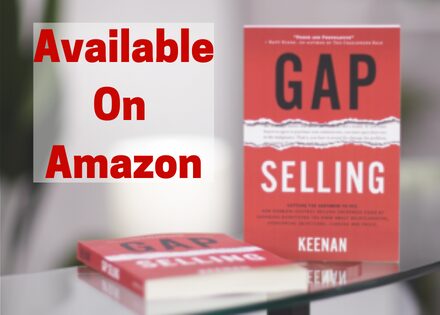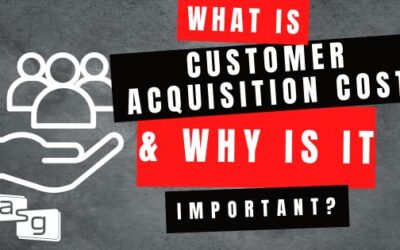All Sales Training Is the Same, Right?
You’ve experienced it. It’s the same old tired approaches to the same old sales challenges, with each company attempting to add their own little “twist” to make them appear different. They talk about closing and overcoming objections, building rapport, building relationships, making that one extra call, “connecting” with a buyer, BANT, or some other acronym that means the same thing, but in their own vernacular and more. Much of today’s sales training is just the regurgitation of the same old selling techniques we’ve been hearing for decades. And, for the most part, I have to agree, there isn’t much difference between most sales training and it’s been that way for over 50 years.
Understanding this, why then write about how Gap Selling is different than Sandler or any other sales methodology? Well, it’s simple. Gap Selling wasn’t created 55 years ago AND it doesn’t address the same old tired, sales topics.
That’s literally the first differentiation between Gap Selling and Sandler Sales Training. Gap Selling isn’t over 50 years old– it was created just 3-years ago. Sandler Sales was created in 1965 and is 55+ years old. Sandler Sales training is old and tired, and I think David Sandler would agree with me. When David Sandler created Sandler Training, he was asked what made Sandler so revolutionary and better than the other established sales trainings. His answer was . . . “They’re old and outdated.”
David Sandler agrees, the best sales training programs must be fresh:
Understanding this, I’ll let David Sandler’s wise words speak for themselves:
Q: What makes your training so revolutionary?
Sandler: There is nothing wrong with the programs taught by Tom Hopkins, Zig Ziglar, or Dale Carnegie and other traditional trainers. The problem with those programs is that they’re old.
Q: Can you explain this?
Sandler: Everyone knows these programs. Everyone knows the kind of questions Tom Hopkins graduates use. Don’t you? Everybody knows how Dale Carnegie trainees repeat your name over and over. Thousands of people have gone through the Xerox selling skills course. Tens of thousands have seen Zig Ziglar on stage, on cable TV, and on video. The problem is these training courses have been around for so long that everyone knows your strategy the minute you start talking. So when you tell customers that [your product’s] price will go up next week, they’ll tell you, “That’s the ‘impending event’ close, isn’t it?” How can you win a Super Bowl if the opposing team has a copy of your playbook?
Sandler Was Right!
David Sandler was right at the time and he’d be right today if he were to be asked about his own training. Everyone has seen it. Buyers know when they are being BANTed. They know when a salesperson is trying to build “rapport.” They know when they are being asked “leading” questions. We’ve all seen it. We can see salespeople from a mile away. We can literally replace the names Zig Ziglar, Tom Hopkins, and Dale Carnegie in the above with Sandler, Solution Selling, SPIN, and Miller Heiman. Tens of thousands of people have gone through them. Just as Sandler said back then, they’ve been around so long, everyone has seen them and knows what’s coming.
Gap Selling is new, refreshing, and relevant to 21st century selling. No gimmicks, manipulation, or hard pressure selling.
There is another area in which Gap Selling is different than Sandler Sales, and we’ll use David Sandler’s words once again. The best way to break this down is to start at the core of the selling methods. Like anything, the core of something’s existence underpins its identity and character. It acts as its compass and this is where Gap Selling sales training and Sandler Sales sales training diverge significantly.
In 1965 when Sandler Sales was created by David Sandler, it was a fantastic and refreshing selling method to sell for the time. It provided sellers with a framework, a set of tactics, and a mindset to attack the sales world (and I use attack deliberately). This interview clip from David Sandler highlights the philosophy underpinning the Sandler Sales sales training method.
Q: We’ve got to get back to your one-liner, “If you can’t kill, you can’t sell.” You don’t see that as overly aggressive?
Sandler: “The problem you’re having with me is when I say kill, you’re thinking literally cutthroat. I am talking about training an attitude and developing an instinct. When you are sitting in front of a prospect, at some point in the presentation you will hear a little voice inside that says, “This is a lot of pressure; perhaps it’s easier outside.” Or you’ll hear, “Let’s get out of here; this is too much.” Or, “This guy is not worth the hassle.”
“At this moment, if you let your killer instincts guide you, you won’t give in, but forge ahead and win. The job needs to be done, that’s why they pay you. Your boss is not buying your need to be liked, your boss is buying your need to go to the bank.”
New School Sales Training
And in David’s own words this is the problem. Sandler is looking at sales in the wrong way. It’s a way completely inconsistent with how 21st-century buyers want to be sold. Killer instincts? Seriously? Your boss is buying your need to go to the bank — really? Could this be anymore Glengarry Glenn Ross? David’s entire answer to the above question is steeped in 55-year-old thinking about sales, the customer, and the relationship between buyer and seller. Selling is not something you do to someone and it’s not a selfish endeavor designed to line the pockets of salespeople and the companies they work for. Selling, when done correctly, is about solving your buyers’ and prospects’ business problems so THEY can make more money, grow THEIR business and eradicate any barrier or barriers to their success. And, in the process of helping buyers be successful, companies and salespeople are rewarded with commissions revenue references, and repeat business. Selling is a “we” business, not an “us vs them” business.
Old school selling and sales training techniques were about your product and the salesperson (product-centric), and Sandler Sales was built to win in that environment. Selling today, in the 21st-century, is about solving problems and helping prospects and their companies achieve amazing desired outcomes (problem-centric). Gap Selling is a sales methodology built to position salespeople to be that 21st-century trusted business advisor.
Successful selling today doesn’t lean on building rapport or bonding, or pressuring buyers into “up-front contracts.” It’s about having the business acumen and diagnosing skills that allow salespeople to help guide a buyer through the process of holistically understanding their current state problems and then helping them navigate the best solutions to those problems in order to achieve their desired outcome or future state.
Sales Training Should Be Fun!
Oh yeah, there is one more difference between Gap Selling and Sandler Sales. We’re not your typical blue blazer, khaki pants-wearing sales training company. Our instructors are fun, energetic, and entertaining. There is nothing worse than sitting in 8, 12, 16, 32 hours of training with a boring, un-engaging, dry, Bueller, Bueller instructor. We have fun!
Sales is fun and should be taught that way. Sales is exciting and should excite your people when learning to sell better. Sales training shouldn’t be like joining a knitting circle, it should be more like going to a Redbull-sponsored event that gets people fired up. (If you want to see just how much fun we have, you can try a free demo of our online sales training courses here.)
Finally, for those of you who are visual learners and prefer video, here’s a fun video we did that highlights the difference between Gap Selling and other selling methods.
Enjoy!
And as a fun final bonus, check out this Lucid Chart that walks you through the Gap Selling Concept.





0 Comments